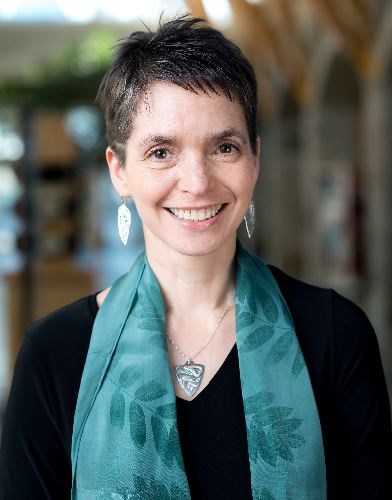After more than five years of work laying out the foundation for revitalizing the Tahltan language, Edōsdi, or Judy Thompson as she is known in English, says she feels a lot of hope.
The assistant professor of First Nations Studies at UNBC has split her time between her academic career and playing a key role in the Tahltan Language and Culture Program, which she helped establish. Edōsdi's work with the Tahltan Central Government recently earned her an award from the Confederation of University Faculty Associations of British Columbia. Each year, the organization's Distinguished Academic Early in Career Award award recognizes the work of academics who perform research and scholarly work to aid community groups outside of the academic setting.
Edōsdi received the award after being nominated by her peers, including Blanca Schorcht, UNBC's dean of arts, social and health sciences.
"That's actually what's really wonderful about being at UNBC. I'm still able to do this work with my nation but still carry on my duties at UNBC. It is becoming part of my research, I'm writing about our work, our Tahltan work," Edōsdi said.
Edōsdi set out to perform a task that would seem daunting to even the most skilled educator: to revitalize a language that had been been driven to the brink of extinction by the Canadian legacy of colonization and residential schools. Of the 4000 members of the Tahltan nation in northwest British Columbia, there are only roughly 30 fluent speakers of the language alive today. As is common with many First Nations in Canada, most fluent speakers are getting older; few millennials have had the chance to learn the language, which forms a cultural bedrock for the Tahltan people.
Edōsdi first set out to explore what it would take to revitalize the Tahltan language when she wrote a doctoral dissertation on the subject. The dissertation ended up serving as the basis for the community framework of the Tahltan Central Government's language programming.
A key component of this work has been the establishment of 'language nests,' which allow toddlers and young children to be immersed in the Tahltan language. In a scene from a documentary commissioned by the Tahltan Central Government to document the work of language revitalization, Edōsdi talks about the importance of these nests.
"Right now we have young children, toddlers, babies, starting to learn the language. They're immersed in it with fluent speakers. So I'm thinking, maybe we'll eventually move out of that endangered status," she said.
The Tahltan Language and Culture Program also runs mentor-apprentice programs for adults who wish to learn the language, has developed a school curriculum, is working on a mobile language tutor app and has worked with the B.C. Teacher's Regulation Branch to certify Tahltan speakers as teachers.
It's a dizzying array of programming, now employing as many as 25 people between the three communities of Iskut, Dease Lake and Telegraph Creek. But five years ago, little of this language infrastructure was in place.
"When I started out in the job, I was doing all levels of work. I was like mopping floors to being the CEO," Edōsdi said.
The team began small, with just three staff spread between different communities.
"There were times when we just had to have a phone call and touch base because we were all kind of on our own. But once we were able to talk to each other - sometimes there were tears, like 'it's so hard!,' Edōsdi said.
The work that Edōsdi has undertaken since 2012 may come to be emulated by other First Nations in B.C. Following a recent announcement by the provincial government of $50 million in funding for language revitalization efforts, many nations have been moving towards laying out a framework plan, much like that established by Edōsdi in her doctoral thesis.
Two weeks ago, the First People's Cultural Council, which will be managing the new funding, announced it would be directing the funds to help nations set out long-term plans for their language programming.
Edōsdi believes this signals a move toward more sustained program development funding, rather than the funding of one-off projects.
"There's more freedom for the nations to make that decision instead of just chasing certain little pots of money for specific projects," she said.

.png;w=120;h=80;mode=crop)

